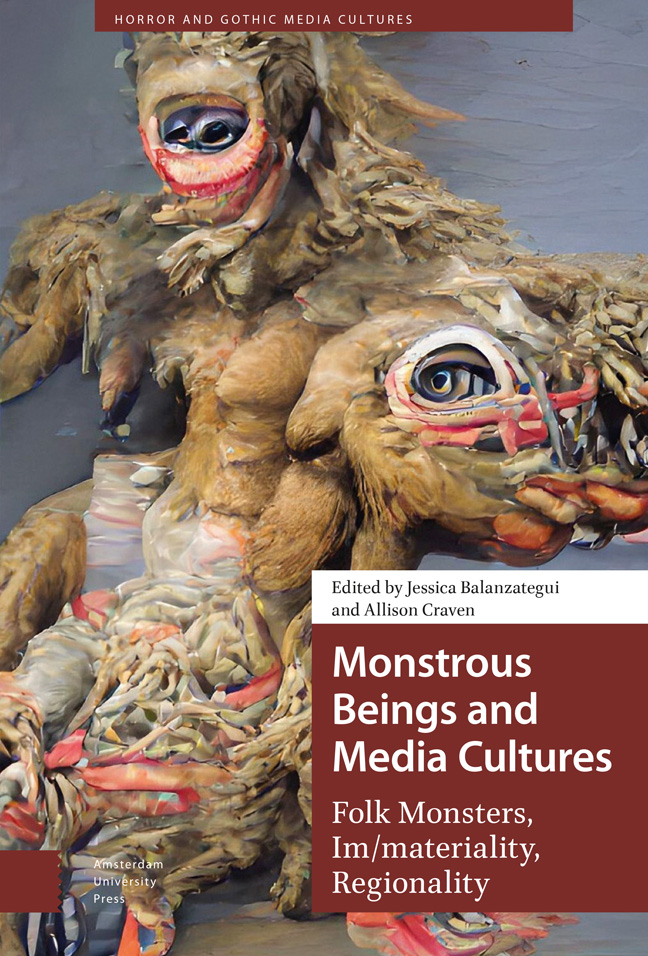Book contents
- Frontmatter
- Contents
- List of Figures
- Acknowledgements
- Introduction: Folk Monsters and Monstrous Media: The Im/materialties, Modalities, and Regionalities of Being(s) Monstrous
- 1 The Momo Challenge as Urban Legend: Child and Adult Digital Cultures and the Global Mediated Unconscious
- 2 “Every Imaginable Invention of the Devil”: Summoning the Monstrous in Eurocentric Conceptions of Voodoo
- 3 The Forest and the Trees: The “Woods” as Intersection between Documentary, Fairy Tale, and Internet Legend in Beware the Slenderman
- 4 Mark Duplass as Mumblegore Serial Killer: Fictional Vernacular Filmmaking in the Creep Series
- 5 Monsters in the Forest: “Little Red Riding Hood” Crimes and Ecologies of the Real and Fantastic
- 6 A Mother's Milk: Motherhood, Trauma, and Monstrous Children in Folk Horror
- 7 Documenting the Unheard: The Poetics of Listening and Empathy in The Family
- 8 Reimagining the Pontianak Myth in Malaysian Folk Horror: Flexible Tradition, Cinema, and Cultural Memory
- 9 An Uncommon Ancestor: Monstrous Emanations and Australian Tales of the Bunyip
- 10 The Folk Horror “Feeling”: Monstrous Modalities and the Critical Occult
- Works Cited
- Mediagraphy
- Index
5 - Monsters in the Forest: “Little Red Riding Hood” Crimes and Ecologies of the Real and Fantastic
Published online by Cambridge University Press: 17 February 2024
- Frontmatter
- Contents
- List of Figures
- Acknowledgements
- Introduction: Folk Monsters and Monstrous Media: The Im/materialties, Modalities, and Regionalities of Being(s) Monstrous
- 1 The Momo Challenge as Urban Legend: Child and Adult Digital Cultures and the Global Mediated Unconscious
- 2 “Every Imaginable Invention of the Devil”: Summoning the Monstrous in Eurocentric Conceptions of Voodoo
- 3 The Forest and the Trees: The “Woods” as Intersection between Documentary, Fairy Tale, and Internet Legend in Beware the Slenderman
- 4 Mark Duplass as Mumblegore Serial Killer: Fictional Vernacular Filmmaking in the Creep Series
- 5 Monsters in the Forest: “Little Red Riding Hood” Crimes and Ecologies of the Real and Fantastic
- 6 A Mother's Milk: Motherhood, Trauma, and Monstrous Children in Folk Horror
- 7 Documenting the Unheard: The Poetics of Listening and Empathy in The Family
- 8 Reimagining the Pontianak Myth in Malaysian Folk Horror: Flexible Tradition, Cinema, and Cultural Memory
- 9 An Uncommon Ancestor: Monstrous Emanations and Australian Tales of the Bunyip
- 10 The Folk Horror “Feeling”: Monstrous Modalities and the Critical Occult
- Works Cited
- Mediagraphy
- Index
Summary
Abstract
Whether in the forest or in the city, monsters are not found but made, and this applies to their construction in narrative genres as well. In popular culture the villain's cruelty in fairy tales and the serial killer's crimes in realistic fictions become “monstrous” because they are somehow preternatural or inconceivable in a (proper) human being. We read the 2017 “Little Red Riding Hood” crime film Pokot (Spoor) in the key of popular green criminology, underscoring how the film's monsters raise questions of what being human is and of how humans relate to non-human animals. In so doing, we draw on the multivalence of fairy-tale tropes and northern and central European folklore and enable a reconsideration of ecologies beyond the confines of realism.
Keywords: green criminology, fairy-tale film, genre, Pokot, justice, “Little Red Riding Hood”
Whether in the forest or in the city, monsters are not found but made, constructed of deep human fears and desires, super-sized projections of prejudices, and far-out transgressions of socially upheld norms. In popular culture, the villain's cruelty in fairy tales and the serial killer's crimes in realistic fictions become “monstrous” because they are larger than life. Somehow preternatural or inconceivable in a (proper) human being, fairytale monsters’ actions raise questions of what being human is and of how humans relate to non-human animals. Here, we read the 2017 “Little Red Riding Hood” crime film Pokot (Spoor) (Holland and Adamik 2017) in the key of popular green criminology in order to explore its representations of the monstrous as relevant to northern and central European folklore, histories, and ecologies.
Contextualising the Monstrous in Pokot: Questions of Genre, Criminology, and Kinship
Once upon a time, in 1975, Hungarian folklorist Tekla Domotor wrote about the folktale and fairy tale as generic ancestors of the twentieth-century detective story and novel. She noted parallel hero/villain binary oppositions in the two, foregrounding their in-common reliance on magic objects (such as the magic nut or lamp and the telephone, respectively) and magic means of transportation (from the winged horse to James Bond's car).
- Type
- Chapter
- Information
- Monstrous Beings and Media CulturesFolk Monsters, Im/materiality, Regionality, pp. 121 - 144Publisher: Amsterdam University PressPrint publication year: 2023



